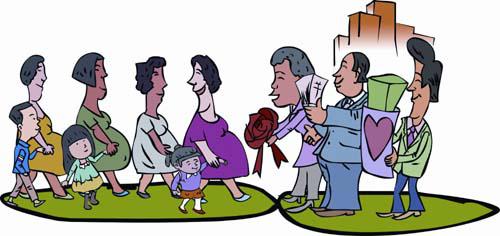Is a Fertility Fund to Encourage Second-Child Births Fair?

More than three decades after its implementation, the family planning policy in China has led to a swiftly aging society with a shrinking young population. Despite the launch of the two-child policy in 2015, there were 17.23 million births on the Chinese mainland in 2017, a decline of 630,000 over the previous year, according to the National Bureau of Statistics. If this trend continues, a nosedive in births in the coming years will be inevitable.
Two professors put forward a proposal in an article published in the Xinhua Daily recently, suggesting that the country should immediately remove all birth limits in response to a sharply declining birthrate. They proposed establishing a fertility fund that would be established by deducting money from the monthly salaries of citizens under the age of 40 until they have two children. Once they have their second child they can withdraw from the fund and receive an additional subsidy from the government. If they do not have a second child, they can only withdraw their payments after they retire.
Their proposal was quickly criticized. Most people believe the so-called fertility fund is a pretence for extracting money from the public, or a fi ne on those who dont have a second child. They say that it is a private issue and to impose fund payments on citizens is breaching their personal rights. Some think that the state should not charge fees, but instead provide tax incentives and other favorable policies to more realistically subsidize families. Yet other people believe the two professors suggestion should not be totally dismissed, as they only meant to help solve the issue and not anger the public.
Incentives not punishment
Li Pengguo (www.rednet.cn): The public refuses to have a second child because they are already strained by the huge pressures of raising one child. It is alright for the state to encourage people to give birth to a second child to sustain economic development, but it is ridiculous to impose deductions on salaries for the so-called fertility fund as a means to force people to have a second child.
Whether or not to have a second child is a citizens private business and a freedom that no one can strip away. Most countries with a low birth rate—notably developed countries—try to encourage childbirth through tax incentives and cash bonuses to subsidize families during child raising. On the contrary, the two professors proposed to force families to have children through fi nes and punishment.
More importantly, having a second child is not something that is affordable for every family. The work and trouble of raising a child in Chinas big cities may be one of the most difficult on the planet due to high house prices.
The professors, enjoying relatively high salaries, houses and cars, cannot feel the pain of ordinary people who are struggling to survive. They take it for granted that ordinary people can raise children as easily as they can. It is because they are not standing on the same level as ordinary people that they propose this nonsense as a solution for the low birthrate issue.
Liang Jianzhang (www.ifeng.com): What we should do is reward those who have a second child, not punish those who do not. To punish through fine-like salary deductions is to add economic pressure on families. The Chinese population needs to see a reduction in its economic burden, since taxation is already very high—including social security and medical insurance—with the tax to GDP ratio rising. This helps to explain why the proposal of a fertility fund is widely criticized.
Both salary deductions for a fertility fund from the population under 40 and collection fees from double-income-no-kid families as a so-called social care tax, are trying to force people to have more children than they want. National policy should neither curb childbirth nor force people to have children.
In most low birthrate countries, the way to encourage child birth is through tax incentives and cash bonuses. Some countries spend 2-5 percent of their annual GDP on child rearing. In contrast, ordinary Chinese families are groaning under the pressure of raising children, not only because of rocketing house prices, but also because of heavy work pressure on Chinese women. As a result, China may have the lowest natural birth rate in the world. The country should at least spend 2-5 percent of its annual GDP on child rearing, equal to 1.6 to 4 trillion yuan ($233 to $582.7 billion). This sounds like a large sum, but when distributed to more than 200 million children around the country, everyone will have access to a little more than 10,000 yuan($1,456) a year, which is a small fraction of the cost of a childs upbringing.
Tax incentives or cash bonuses for families with more than one child are actually taxes transferred from other tax payers to these families. Is this a fair practice? In modern society, a countrys pension and education expenditures are actually taxes collected from the working population. Generally speaking, pension and senior care expenses far outweigh those of education. When taking care of the elderly is made a social program, it means that young peoples salaries will be used to support all senior citizens, including those who do not have children. To have more children means that in the future more young people will contribute to the pension pool, so in this sense, to ask the whole society to share the burden of child raising is fair.
As for how to encourage childbirth, there are many methods. For example, there can be a deduction or waiver of social security payments for these families. Personal income tax reductions and cash bonuses can also subsidize child rearing. Equally important is rational educational resource planning and distribution. Nursery services and infant care should all be covered by compulsory free education. Maternal leave should also be extended while a womans right to work should be protected during and after her leave. In addition, fathers should be granted paternity leave to share the burden of taking care of the newborn baby, which will also help diminish discrimination against women in the labor market.
Not a completely new idea
Ma Guangyuan (www.sina.com.cn): A fertility fund based on deductions from monthly salaries is equal to a fi ne. What a shameless proposal. It is important to relax control on childbirth, but by no means should this be used as a new excuse to collect money from the public.
However, this ridiculous proposal makes some sense. In the past, extra births were fi ned. Thus, this fund must still exist somewhere, as there has been no announcement that it has been spent on programs yet. Now, since child birth is encouraged, this fund should play a role in the new era. Those who have a second child should be rewarded with some cash, but those who do not should not have their salaries deducted.
Sun Jianbo (baijiahao.baidu.com): The authors propose offering cash bonuses to families with two children, instead of fi ning one-child families. It is a kind of housing accumulation fund-like tax relief arrangement. If citizens get a salary deduction, they can receive interest from this income and this part of their salary will not be taxed.
Even some scholars have lashed out at the idea of a fertility fund. I guess they have not read the article thoroughly enough. They must have misunderstood the proposal as simply collecting money from the public.
Actually, we already have a form of fertility fund in maternity insurance, which is paid by employers. Maternity benefi ts come from this insurance fund. As for the fertility fund proposed by the professors, many people will choose it as a way to avoid taxation even if not forced to. In any case, the payment can be extracted one day from the fund, much more worthwhile than ordinary insurance programs.
As far as I am concerned, I do not support this fund. If the payment is large, no companies will want to employ women, as the fund will pose a big fi nancial burden on employers.
As for the professors who put forward the idea of a fertility fund, they do not mean to hurt anyone, but are trying to do something good for the country. Most of the negative comments are based on an incomplete reading of the article. It will discourage scholars from putting forward their true ideas if they are always bristled the minute they post somewhat provocative articles. Discussions and debate is much better than the current criticism of the proposal.

